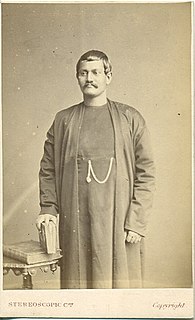A Quote by William Melmoth
I look upon enthusiasm, in all other points but that of religion, to be a very necessary turn of mind; as indeed it is a vein which nature seems to have marked with more or less strength, in the tempers of most men. No matter what the object is, whether business, pleasures or the fine arts: whoever pursues them to any purpose must do so con amore.
Related Quotes
Religion! Is what you hear at church religion? Is that which can bend and turn, and descend and ascend, to fit every crooked phase of selfish, worldly society, religion? Is that religion which is less scrupulous, less generous, less just, less considerate for man, than even my own ungodly, worldly, blinded nature? No! When I look for religion, I must look for something above me, and not something beneath.
Very few men can speak of Nature, for instance, with any truth. They overstep her modesty, somehow or other, and confer no favor.They do not speak a good word for her. Most cry better than they speak, and you can get more nature out of them by pinching than by addressing them. The surliness with which the woodchopper speaks of his woods, handling them as indifferently as his axe, is better than the mealy-mouthed enthusiasm of the lover of nature. Better that the primrose by the river's brim be a yellow primrose, and nothing more, than that it be something less.
The incipient magician will confess his faith to a universal religion. He will find out that every religion has good points as well as bad ones. He will therefore keep the best of it for himself and ignore the weak points, which does not necessarily mean that he must profess a religion, but he shall express awe to each for of worship, for each religion has its proper principle of God, whether the point in question be Christianity, Buddhism, Islam or any other kind of religion.
The true object of religion is to bind mankind together, and to bind them all to God. If we see that in the name of religion, men, instead of promoting peace on earth and good-will among men, are trying to show their antagonism and animosity towards each other, then certainly we must stand forward with our voice of protest, and say that religion is defeating its own legitimate object.
Our minds are forced to become fixed upon different things by an attraction in them which we cannot resist. To control the mind, to place it just where we want it, requires special training. It cannot be done in any other way. In the study of religion the control of the mind is absolutely necessary. We have to turn the mind back upon itself in this study.
What is necessary for 'the very existence of science,' and what the characteristics of nature are, are not to be determined by pompous preconditions, they are determined always by the material with which we work, by nature herself. We look, and we see what we find, and we cannot say ahead of time successfully what it is going to look like. ... It is necessary for the very existence of science that minds exist which do not allow that nature must satisfy some preconceived conditions.
Enthusiasm is always connected with the senses, whatever be the object that excites it. The true strength of virtue is serenity of mind, combined with a deliberate and steadfast determination to execute her laws. That is the healthful condition of the moral life; on the other hand, enthusiasm, even when excited by representations of goodness, is a brilliant but feverish glow which leaves only exhaustion and languor behind.





































